Portland Business Alliance Supports Banning Criminal History Check Box on Job Applications





 Email to a friend
Permalink
Email to a friend
Permalink
Monday, March 09, 2015
Lianna Palkovick, GoLocalPDX Contributor
The Portland Business Alliance, Oregon Association of Minority Entrepreneurs (OAME), and the Hispanic Metropolitan Chamber announced today that they support "banning the box" on employment applications to open up job opportunities to individuals with criminal backgrounds. The "box" is the section on many employment applications which asks whether the applicant has been convicted of a crime of been incarcerated.
The "box" is the section on many employment applications which asks whether the applicant has been convicted of a crime of been incarcerated.
"We understand that many qualified individuals are turned away from potential employment simply because they honestly disclosed a criminal history on an employment application," said Sam Brooks, OAME founder. "Banning the box shifts the conversation about criminal histories off the application and into the interview process, so that applicants and potential employers will have an opportunity to discuss the circumstances."
Although "banning the box" can open up employment opportunities to many potential applicants, there are questions as to how restrictive legislation should be.
"[Employers] must balance a need to ensure the safety of their employees and their customers by thoroughly screening job applicants. Banning the box makes sense, but employers need flexibility to review applicant backgrounds during the interview process," said Sandra McDonough, president and CEO of the Portland Business Alliance.
The proposal being considered by Portland City Council would severely limit employers' abilities to conduct criminal background checks - prohibiting them until a conditional offer of employment has been made - which business leaders say is too restrictive and could impede their hiring efforts.
"Pushing any opportunity for a criminal background check to the very end of the process, coupled with a private right to legal action if the applicant is not selected, seems to set up a process that could lead to contentious legal fights rather than creating more opportunities for work. There should be a different way to achieve the goals we all agree to, which is greater employment opportunities," said Gale Castillo, president of the Hispanic Metropolitan Chamber.
There are still many details to be worked out, but Ban the Box legislation has been successfully passed in more than 50 jurisdictions and 10 states.
Oregon may soon join the list, offering everyone the opportunity for equal employment opportunities.
Related Slideshow: 13 Times Portland Boycotted Harder Than Any Other City
According to data compiled by the Current Population Survey, Portland is the American city with the greatest participation in boycotts.
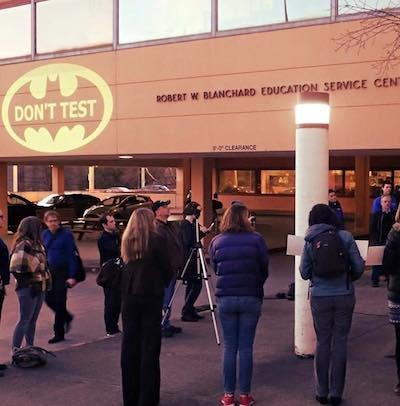
Prev
Next
Standardized Testing
Portland High School Students refused to take the Oregon Assessment of Knowledge and Skills (OAKS) test in 2013. A growing movement among Portland parents to boycott the Smarter Balanced Test Consortium by “opting out” their children from taking the tests is ramping up as the test date nears.
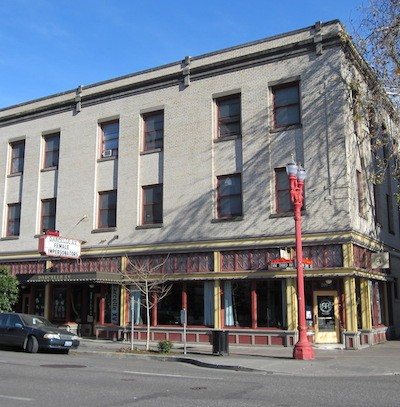
Prev
Next
Portland’s Premier Gay Bar
Numerous incidents have gained C.C. Slaughter’s, Portland’s biggest LGBT night club, a reputation for being overly strict, including newly-weds being barred from entering due to their attire, and the club’s ultra-stern drinks policy. After a newly-wed couple was banned from entry, a boycott was born.
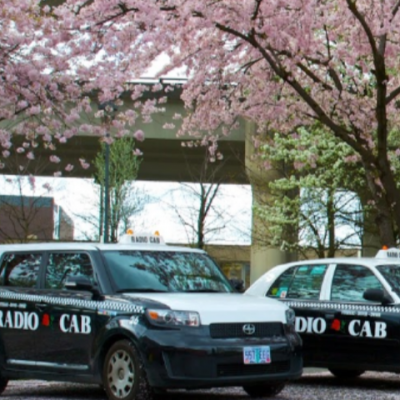
Prev
Next
Uber
Amid much anticipation, protest, and by-laws prohibiting the controversial ride-sharing company, Uber rolled into Portland in Dec. 2014. While a city task force works to amend the rules that would allow Uber and companies like it to operate, taxi companies have taken action, and numerous individuals announced their boycotts through social media.

Prev
Next
The Arts Tax
The $35 annual Arts Education Income Tax, to be paid by all Portlanders to fund arts in schools, was one of the most successful boycotts in the city. In addition to social media initiatives to boycott the tax, less than half of Portlanders had paid their arts tax in the first two years.
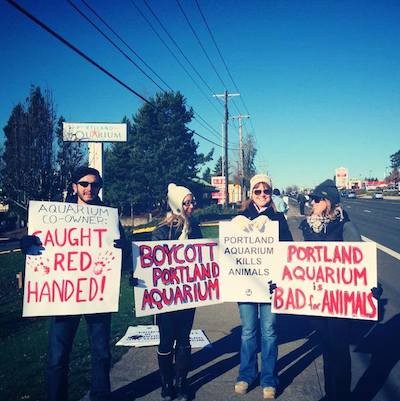
Prev
Next
The Portland Aquarium
A social media movement to boycott the Portland Aquarium grew among Portlanders who say they are concerned over the treatment of marine wildlife in a captive environment.

Prev
Next
Barilla Pasta
After an executive at Italyian pasta maker Barilla Pasta said he would never feature an advertisement with LGBT families, consumers worldwide boycotted the company’s products. Portlanders took to the boycott like a Portlander takes to a boycott.
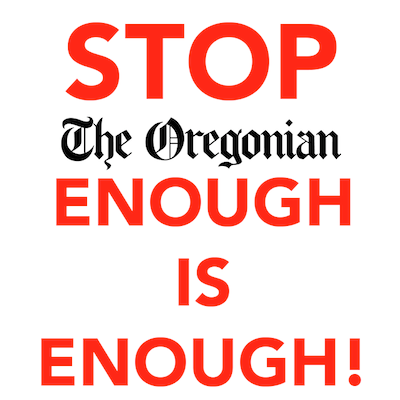
Prev
Next
The Oregonian
A group of Oregon readers, concerned over changes at the state’s biggest paper, launched a Facebook page to boycott the Oregonian on the grounds that it “has gone off the rails after getting a neo-con publisher then a neo-con editorial page editor. Since then, its coverage has been carrying water for corporations while attacking workers, public education, and basic public services.”
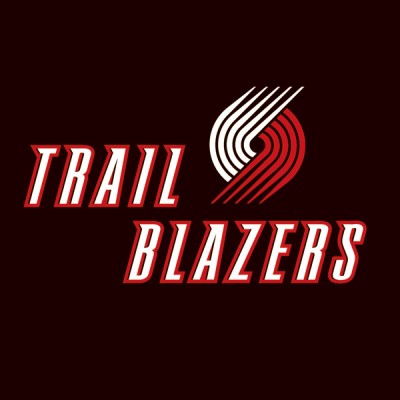
Prev
Next
The Trail Blazers
A Christian group launched a boycott of the Portland Trail Blazers basketball team in 2014 after the Blazers announced their support for the Freedom to Marry and Religious Protection ballot initiative.
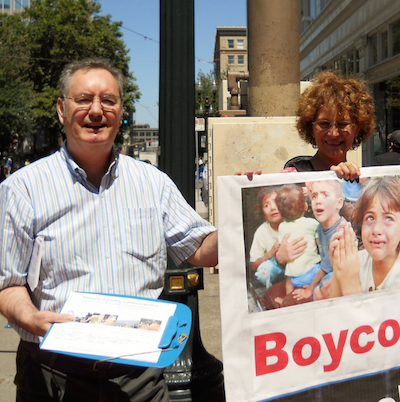
Prev
Next
SodaStream
The Israeli company behind the at-home soda-maker SodaStream faced boycotts around the world for manufacturing its product in an Israeli settlement in contested Palestinian territory. In Portland, the group Friends of Sabeel North America organized events in the downtown core, handing out leaflets and wearing placards.

Prev
Next
City Bikes
Portland Anti Fascist group Rose City Antifa boycotted Portland cyclery Citybikes in 2012, alleging the company’s owner, Tim Calvert, held anti-semitic views and organized for racist causes. Two Citybikes employees left the shop amid the pressure, according to Bike Portland.
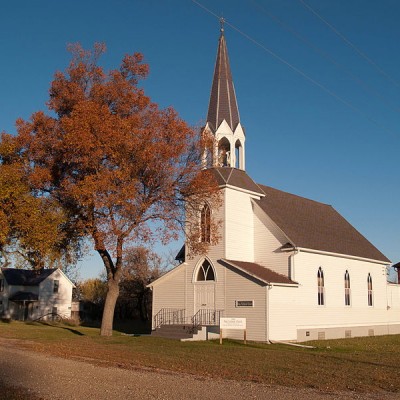
Prev
Next
Mass
In 2010, a group of Catholic women from Northeast Portland’s St. Andrew Parish boycotted mass, in response to an 81-year-old Irish woman’s call to protest the treatment of women in the church. The group held prayers and gospel in downtown Portland’s Parks Blocks.

Prev
Next
A Vegan ‘Safe Space’ Cafe
In 2010, an armed police officer was asked to leave SE Portland’s Red and Black Cafe for violating its safe space policy, prompting a boycott from some members of the community. In true Portland fashion, some protested the boycott.
Enjoy this post? Share it with others.





 Email to a friend
Permalink
Email to a friend
Permalink













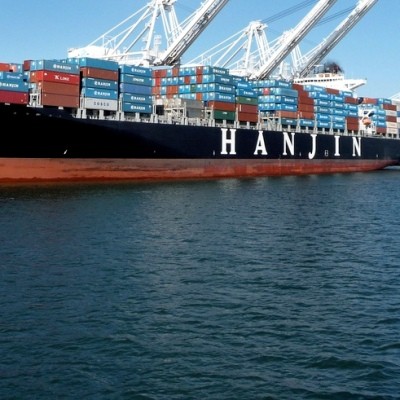

















Follow us on Pinterest Google + Facebook Twitter See It Read It